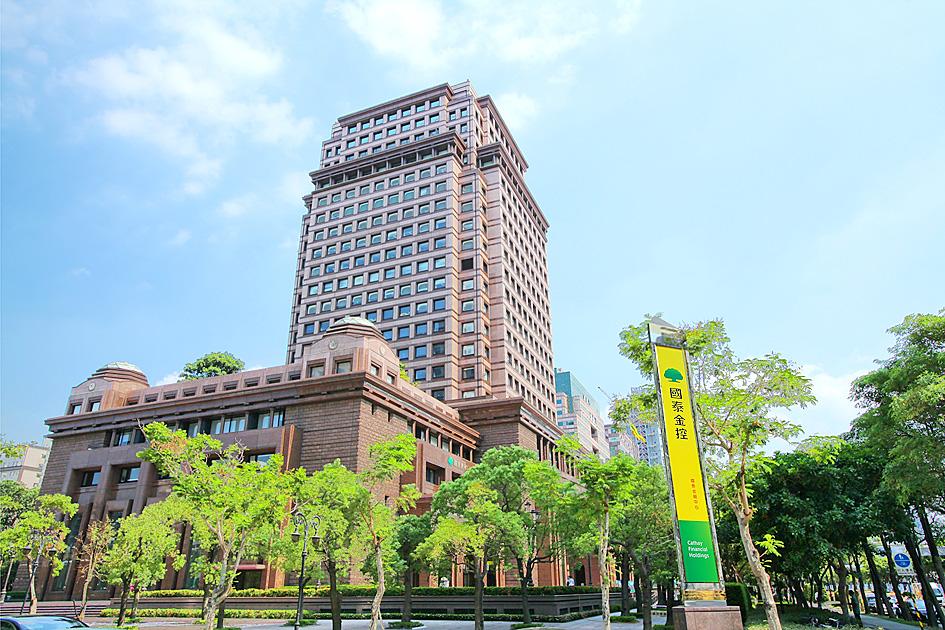The depreciation of the New Taiwan dollar against the US dollar and increases in bond yields in the first quarter helped Cathay Life Insurance Co (國泰人壽) maintain decent investment returns, despite a global stock market correction, the insurer said yesterday.
The flagship arm of Cathay Financial Holding Co (國泰金控) reported an after-hedging investment return of 4.74 percent, down from 6.31 percent a year earlier, but still the second-highest figure for the first quarter, the insurer said.
While last year’s record investment returns were driven by an equity boom, this year’s came from lower foreign-exchange hedging costs, capital gains and higher yields from overseas bonds, Cathay Life executive vice president Lin Chao-ting (林昭廷) told an investors’ conference in Taipei.

Photo courtesy of Cathay Financial Holding Co
The insurer reported a hedging gain of 0.43 percent for the first quarter, as its proxy hedging strategy worked as the local currency weakened against the greenback by about 3 percent, Lin said.
“We usually forecast a forex hedging cost of 1 to 1.5 percent, but it seems that the costs might be even lower this year,” Lin said.
The insurer disposed some stocks to realize capital gains in the first quarter, reducing its investments in local stocks by 6.5 percent from the end of last year to NT$485 billion (US$16.4 billion) and those in overseas stocks by 2.3 percent to NT$454 billion, company data showed.
Returns on its investments in local stocks nearly halved from 20.9 percent a quarter earlier to 10.5 percent and returns on foreign stock investments fell from 11.6 percent to 8.8 percent, the data showed.
“The stock market corrections have provided us with a chance to buy on dips, and we will focus on blue-chip stocks and those with rosy dividends,” Lin said.
Meanwhile, Cathay Financial Holding Co (國泰金控) president Lee Chang-ken (李長庚) said that Cathay Life Insurance and Cathay Century Insurance Co (國泰世紀產險), its property insurance unit, would relax their compensation terms for COVID-19 insurance policyholders to ease the burden on hospitals.
According to the terms, the insurers are not obliged to compensate policyholders with mild COVID-19 symptoms who are not hospitalized, but the insurers would compensate them if they are prescribed medication by a doctor, Lee said.
Cathay Century Insurance has sold 1.3 million COVID-19 insurance policies with a total premium income of NT$1.47 billion and has distributed compensation of about NT$300 million, with the average compensation amounting to NT$20,000, it said.
It expects to compensate more policyholders this month and next month as the number of COVID-19 cases rise, it added.
The property insurer’s risk-based capital ratio stands at 284 percent and it has not determined whether to apply to use a special reserve to absorb the losses, it said.

The US dollar was trading at NT$29.7 at 10am today on the Taipei Foreign Exchange, as the New Taiwan dollar gained NT$1.364 from the previous close last week. The NT dollar continued to rise today, after surging 3.07 percent on Friday. After opening at NT$30.91, the NT dollar gained more than NT$1 in just 15 minutes, briefly passing the NT$30 mark. Before the US Department of the Treasury's semi-annual currency report came out, expectations that the NT dollar would keep rising were already building. The NT dollar on Friday closed at NT$31.064, up by NT$0.953 — a 3.07 percent single-day gain. Today,

‘SHORT TERM’: The local currency would likely remain strong in the near term, driven by anticipated US trade pressure, capital inflows and expectations of a US Fed rate cut The US dollar is expected to fall below NT$30 in the near term, as traders anticipate increased pressure from Washington for Taiwan to allow the New Taiwan dollar to appreciate, Cathay United Bank (國泰世華銀行) chief economist Lin Chi-chao (林啟超) said. Following a sharp drop in the greenback against the NT dollar on Friday, Lin told the Central News Agency that the local currency is likely to remain strong in the short term, driven in part by market psychology surrounding anticipated US policy pressure. On Friday, the US dollar fell NT$0.953, or 3.07 percent, closing at NT$31.064 — its lowest level since Jan.

Hong Kong authorities ramped up sales of the local dollar as the greenback’s slide threatened the foreign-exchange peg. The Hong Kong Monetary Authority (HKMA) sold a record HK$60.5 billion (US$7.8 billion) of the city’s currency, according to an alert sent on its Bloomberg page yesterday in Asia, after it tested the upper end of its trading band. That added to the HK$56.1 billion of sales versus the greenback since Friday. The rapid intervention signals efforts from the city’s authorities to limit the local currency’s moves within its HK$7.75 to HK$7.85 per US dollar trading band. Heavy sales of the local dollar by

The Financial Supervisory Commission (FSC) yesterday met with some of the nation’s largest insurance companies as a skyrocketing New Taiwan dollar piles pressure on their hundreds of billions of dollars in US bond investments. The commission has asked some life insurance firms, among the biggest Asian holders of US debt, to discuss how the rapidly strengthening NT dollar has impacted their operations, people familiar with the matter said. The meeting took place as the NT dollar jumped as much as 5 percent yesterday, its biggest intraday gain in more than three decades. The local currency surged as exporters rushed to